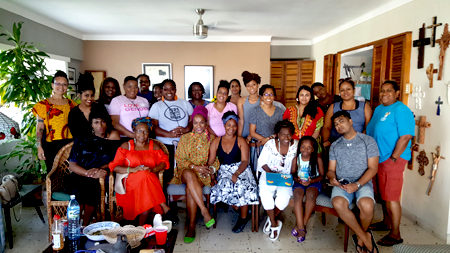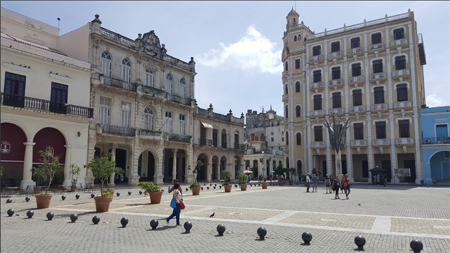Cuba Study Tour 2018

The IGDS Cuba Study Tour 2018 was held in Havana, Cuba from May 29th to June 5th 2018 in conjunction with the Caribbean Studies Association Conference (June 3-7, 2018). The study tour included four days of activities, beach day, one personal day, and participation in the CSA Conference. Students engaged in a variety of activities – organised lectures and presentations with University of Havana professors, visits at National Centers, Museums, and Organisations, meetings with students and activists, and more.
The goals of this study tour included:
- introduce graduate students to a regional vision of development;
- offer graduate students practical and hands-on learning through an engaged study-tour of Cuba as a historical, political and cultural site of knowledge, resistance, and development;
- enhance research and course work and learn further about the importance of women and women’s movements in Caribbean development and transformation;
- participate in and/or present at the Caribbean Studies Association conference – the largest and most important academic conference for Caribbean Studies.
Participation
IGDS St Augustine Unit: Fourteen students from St Augustine Unit: Renuka Anandjit, Yolanda Simon, Marcus Kissoon, Aleeya Rambali, Sasha Sahadeo, Giselle Butcher, Gloria Pemberton-Sones, Adeola Young, Nataki Lewis, Adaeze Greenidge, Richie Daly, Tivia Collins, Rachel Taylor, and Gina Grenado. Three staff from St Augustine Unit: Gabrielle Hosein, Angelique Nixon, and Sue Ann Barratt.
Regional Coordinating Office, Mona Campus: Four students: Diana Thompson, Trudy-Ann Deer, Beverley Joseph and Charmaine Huntley. Two staff from Mona Unit and RCO joined us for the CSA conference: Dalea Bean and Carla Moore.
St Augustine Unit - Presentations at the CSA Conference: Three graduate students - Tivia Collins, Richie Daly and Gina Grenado. Three Academic Staff - Gabrielle Hosein, Angelique Nixon, and Sue Ann Barratt. In addition, eight students attended the conference for the week.
Study Tour Details
University of Havana, School of Economics, Caribbean Studies Programme was the official sponsor of the Study Tour. – 3 Days of activities with presentations from University of Havana faculty, meetings with women’s organisations, leaders, and visits to organisations and centers. One day with a guided tour of Old Havana and meetings & presentations with LGBT and women activists.

Student Reflections
Adaeze Greenidge, MSc Graduate
IGDS St Augustine Unit
“Cuba was amazing. The trip summed up to be more than I anticipated. From the arrival at the Jose Marti Airport to the nightly outings, Cuba was one of the best experiences of my life. The Institute for Gender and Development Studies granted me not only a solid academic experience but also an all round life-changing educational endeavour. Visiting another Caribbean island with an incredibly complex history really allowed me to apply theories that the university taught me. The intersectional lessons and discussions that the IGDS facilitated over my two years, provided me with a very clear outlook on the Caribbean, identity, culture, gender and history. I saw Cuba through the eyes of multiple people. Of course the beaches were beautiful and the food was enjoyable, but the conversations with locals from varying backgrounds showed me what Caribbean history really looked like. It also opened my eyes to alternative lifestyles and different modes of governance and experiences. Race, class, gender, colour and ethnicity do not look the same throughout the Caribbean and certainly around the world. This practical and engaging trip expanded my mind and thinking. This was an extraordinary Caribbean experience and I wouldn't change it for the world.”
Adeola Young, MPhil Candidate
IGDS St Augustine Unit
“Cuba awakened the revolutionary in me as well as the spirit of humility and purpose. The lectures and visits to the university of Havana were extremely useful to my understanding of a society that is misrepresented. The CSA conference was eye opening. I meet a Puerto Rican who presented on Climate change and the hurricane relief efforts, Black Americans who teach in prisons, disability studies experts and saw Haitian films. I appreciated such a wide variety of knowledge and interest for work outside of my field. It was like going through various sections of the library. The center for friendship showed an admirable side of Cuba where diplomacy was just on the basis of love and respect for other countries. I bonded with people and made memories to last a lifetime. The rich history and art pieces depicted the intricacies of diversity. Cuba is a gem. A place where social interaction is pure. The lack of internet in many places allowed me to go out and interact with persons daily. While doing so I made a friend for life, Orlandito a medical student. We shared stories, dreams and laughs. This is an experience I would recommend to any academic to realign themselves and get a unique perspective. Writing became easier, unplugging became valued. I experienced growth.”
Renuka Anandjit, MSc Graduate & PhD Candidate
IGDS St Augustine Unit
“Motherland is Humanity” This powerful quote fuels the philosophy of the Cuban foreign relations and ideology of cooperation. As they have built and continue to strengthen foreign relations, they embrace the basic principles of internationalization, the will to develop states and the defense of independence and sovereignty. Despite their inability to provide fiscal resources, investment and trade opportunities, they play the role of magnanimous friend to the Caribbean region through their scholarship and health professionals programme. They have served the region to strengthen health and other systems well, contributing to regional development through human resources, which my country Guyana has benefited tremendously from. Cuba has reinforced the value of building relationships, strengthening diplomatic ties, cultivating friendships, promoting peace and solidarity and has proven that investment and trade are not the only way to contribute to development, build and maintain solidarity and ties across the region. An ideology I embrace and work toward realizing as my path toward regional integration and solidarity building unfolds.
Tivia Collins, PhD Candidate
IGDS St Augustine Unit
“As a PhD candidate at IGDS, the trip to Cuba expanded my understanding of the Caribbean region, as I was exposed to a country with regional historical significance, revolutionary thinking and action. Cuba made me consider what contemporary revolutionary praxis would look like within the Caribbean, and how there is greater need for the Anglophone Caribbean to preserve and teach their histories and herstories. Importantly, I am reminded of the damages of neo-colonisation, imperialism and capitalism, as well as the harsh truths about socialism... especially how steeped it is in androcentrism. Finally, I feel a greater responsibility to continue to fight against all forms of systemic and cultural violence and oppression, through my research and activism, because battlegrounds can quickly turn to selfie havens, and freedom fighters will die, often with their visions.”













